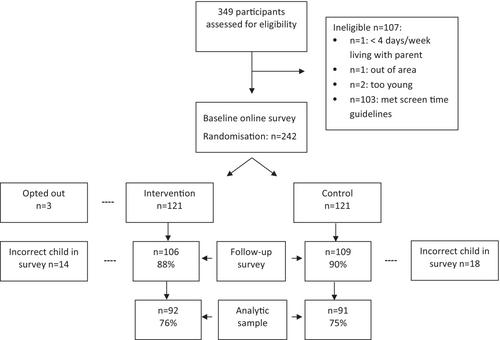The feasibility, acceptability and potential efficacy of a parental text message and social media program on children's vegetable consumption and movement behaviours: A pilot randomised controlled trial
Abstract
Issue Addressed
Australian children fall short of meeting the dietary, physical activity and sedentary behaviour guidelines. This study aimed to test the feasibility, acceptability and potential efficacy of a parental text message and social media program on, primarily, their school-aged children's vegetable consumption and movement behaviours, and, secondarily, their own.
Methods
Between August and November 2022, we conducted a two-armed randomised controlled trial with 242 parents/caregivers of primary school-aged children in New South Wales. The ‘Adventure & Veg’ intervention ran for 8 weeks, promoting vegetable eating behaviours, local outdoor physical activity opportunities and ideas for reducing screen time. Feasibility and acceptability were assessed via recruitment and retention data, intervention metrics and self-reported participant data. Vegetable intake and movement behaviour data were collected via online-surveys and effect sizes were examined.
Results
Most participants reported that they enjoyed receiving the text messages (88%) and the delivery frequency was acceptable (94%). Limitations to Facebook as a delivery platform were reported. The majority of participants used the text messages to influence the vegetable eating (65%) and movement (77%) behaviours of their child. Significant effects were observed among intervention child participants compared with control for mean daily vegetable consumption (0.45 serves, CI: .19; .71, p = .001, d = .5); weekly vegetable variety (1.85, CI: .25; 3.45, p < .001, d = .6); and weekly physical activity variety (.64 CI: .09; 1.19, p = .022, d = .3). Parents in the intervention group increased their daily vegetable intake by .44 serves (CI: .11; .78, p = .01, d = .4).
Conclusions
A parental text message and social media program has potential to support children's vegetable intake and movement behaviours. Further research is required to explore different online delivery methods to promote local outdoor activity options.
So What?
The Adventure & Veg program holds promise as a stand-alone health promotion intervention or as a useful adjunct to current family or school-based healthy lifestyle programs.


 求助内容:
求助内容: 应助结果提醒方式:
应助结果提醒方式:


